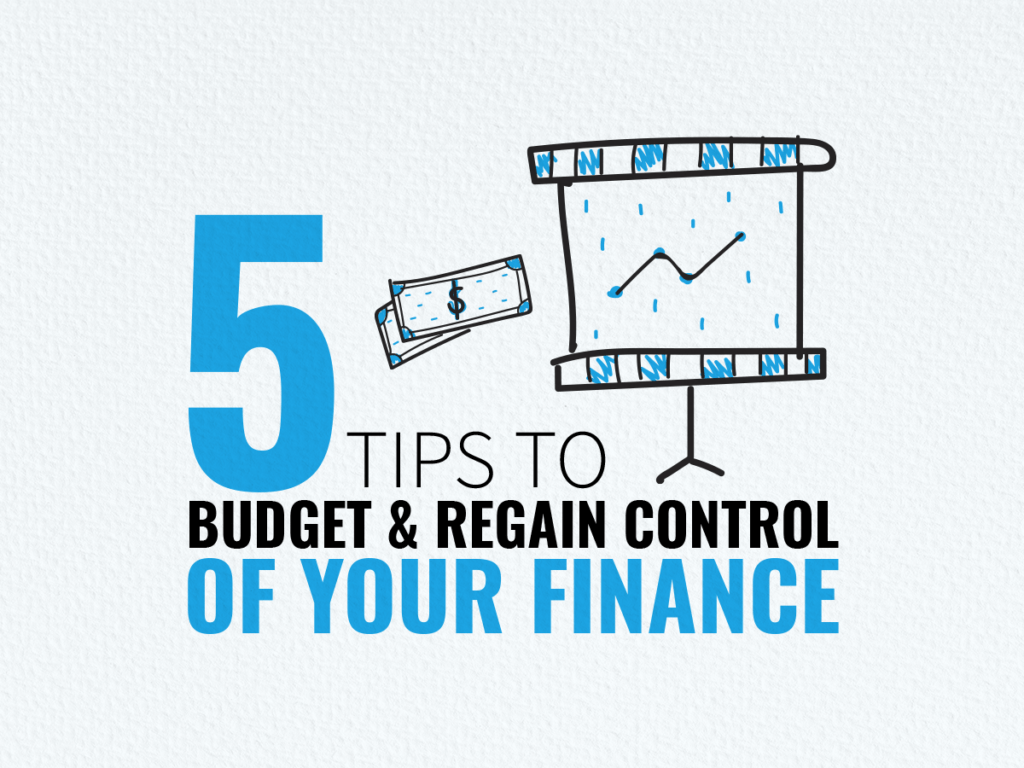One of the most important life skills to have is learning how to stretch your dollars. However, doing that is easier said than done. Most people want to have enough money to cover their needs and their wants, but not everyone succeeds in doing so. Whether you’re living on your own for the first time or just want to know how you can regain control of your finances, we got you covered. Read on for some solid budgeting tips for beginners!
Importance of Budgeting

The main purpose of a budget is to have the upper hand in your financial situation. One of the best things about a budget is that it helps us understand our money. It allows us to know how much money we have, how it’s being used, and more. It makes us more self-aware of our finances and helps us make beneficial decisions for the long run.
If you’re like most Americans, you’ve probably gotten tips from family, older friends and relatives on how to live on your own. It’s something we discuss among ourselves. Yet few people talk to their loved ones about what to spend money on. In our culture, it’s impolite to discuss money at length, but discussions are what helps people make the right financial decisions. Without proper guidance, many people end up taking out loans and racking up debt, or are content with living paycheck-to-paycheck.
Using up your salary right before the next check — a common technique most Americans use — is not only financially dangerous, but it’s also incredibly stressful. In fact, it’s one of the major reasons why stress is a bigger problem now than ever.
Oftentimes, we avoid financial planning altogether because budgets can be difficult to figure out, and life can be quite unpredictable. However, budgeting is a continuous process that requires consistent efforts on our end. When we take the time to properly prioritize and organize our spending, we can regain greater control of our lives — especially in the midst of all this uncertainty.
How to Start Budgeting
Many people who start organizing their finances find that the first hurdle for them is learning how to stick to a budget. Having a budget is the cornerstone of basic finance. If you can stick to one, you will find it easier to make plans for your money. Unsure how to build a budget and stay with it? Here are 5 things that can help you start!
1. Track Your Expenses & Spending Habits
Before you can create a realistic budget, you must know what your current spending habits are. If your budget isn’t realistic, it’s nothing more than a wish list. You won’t know if your budget is applicable until you have an idea of where your money is currently going towards. Most experts recommend categorizing and tracking your spending for about a month to get a clear picture of your expenses. Here are 3 simple and easy options to keep track of your spending habits:

- Record your expenses in a spreadsheet or notebook. Whenever you make a purchase, write it down or enter it into a spreadsheet. This is the most hands-on approach to keeping track of your expenses. However, it can be easy to forget your expenditures if you do not write them down immediately. Hence, it’s a good idea to keep your receipts so you can record them later on.
- Use an App. If you don’t have a laptop or notebook at hand, using an app on your phone to track your expenses is a great way to ensure you won’t forget to do so. Free apps such as Mint, 1Money, or Moneylover make it easy to input your monthly income and categorize your expenditures to get a visual of where your money is going to.

- Use your credit card or bank statements. Credit card and bank statements can aid you in tracking your expenses. However, this approach is less likely to produce detailed results since you may not remember what a particular transaction was for. Still, if you want to begin your budgeting right away, going back over a month or two of old statements can give you an idea of how your finances are.
2. Try to Cut Any Unnecessary Expenses

If your expenses are so high that it prevents you from saving as much as you would like, it might be time for you to make some changes. Identify any nonessentials that you can cut back on, such as entertainment services or ordering takeout. Try looking for ways to save on your fixed monthly expenses, such as a lower phone plan or television service. Here are some ideas for trimming everyday expenses:
- Cancel any subscriptions or memberships you don’t use often — especially if they renew automatically.
- Try to commit to ordering takeout only once a month. If you must eat out or order takeout at least once a week, try ordering from places that are on the cheaper end.
- Give yourself a few days to cool off before an impulsive purchase. It’s extremely easy to be tempted by a nonessential purchase for instant gratification. However, before you click that purchase button, wait a few days to think about whether you truly need that product. You may be glad you passed — or you may prefer to save up for a nicer purchase instead.
3. Set Saving Goals & Decide On Your Priorities
One of the crucial components of creating a budget is to identify a goal. If you don’t use your budget to ensure you’re working towards a specific goal, all you’re doing is shifting your money around. Start by thinking of short-term or long-term goals you might want to save for — whether it be for a new car, a mini getaway, or retirement. After you have determined your financial goal, figure out how much money you’ll need and how long it might take you to save it.

If you’re saving for your retirement or your child’s education, you should consider putting your money into an investment account such as an IRA or 529 plan. With reports of the stock market dropping and businesses foreclosing, it’s easy to be anxious about the risks of your investments. However, it’s important to remember the bigger picture: markets tend to return to health in the long run. While financial experts may give different advice, everyone’s individual circumstances are different. This is why it is important to consider talking to a financial advisor about the most beneficial decision for you right now.
Helpful Tip: Try setting small, achievable short-term goals that you are not likely to have the money on hand to pay for immediately, such as a new smartphone or laptop. Reaching smaller goals — and enjoying the fun reward you’ve saved for — can give you a psychological boost that makes the payoff of saving more immediate and reinforces the habit.
4. Determine a Budgeting Method or Technique
Now that you’ve reviewed your financial goals and have cut out any unnecessary expenses, it’s time to actually create your budget. There are numerous types of budgets, but here are the primary options you can start out with:

- The 50-30-20 Budget Method. This method was popularized by Senator Elizabeth Warren in her book, All Your Worth: The Ultimate Lifetime Money Plan. With this approach, 50% of your after-tax income is allocated towards necessities, such as rent, groceries, and utilities. Thirty percent is designated for your wants, such as entertainment or trips. Your remaining 20% is reserved for your savings. If you choose this approach, you’ll have a lot more flexibility in your budget. However, this may still leave room for irresponsible spending in some areas. Automating savings is crucial to making this budget work to ensure you don’t ever shortchange yourself.
- Zero-Based Budgeting Method. This approach publicized by Dave Ramsey consists of ensuring your expenses match your income each month. In other words, every dollar that’s coming in each month is assigned a purpose, with some going into savings while the rest is assigned to different spending categories. Because this type of budget can be quite restrictive, it may not be right for everyone. However, it’s extremely helpful to avoid overspending and meet your financial goals efficiently.
5. Streamline Your Personal Finance Plan

After you’ve created your budget, the challenging part is sticking to it. It’s important to figure out how to live by your budget and implement those changes in your daily life. Some people may be disciplined enough to just do it, but the majority of us need support to ensure we’re staying on track. Here are also techniques that can help you to stick with your budget:
- Automate Your Bills. Put your bills on autopay and automate transfers to retirement and savings accounts. When money is placed where it needs to go before you get a chance to see it, you’re less likely to spend it.
- Befriend Your Apps. It’s important to continue to keep track of your spending to ensure you’re sticking within your limits. By using a money management app, you can link your credit or banking accounts with the budgeting software and immediately see where your money is going.
- Create an Envelope System. If you’re more of a hands-on person, an envelope system allows you to physically label and put cash in an envelope for each spending category. You can only spend money from the assigned envelope in each category. When the money is all gone, you’re done spending for the month.
- Coordinate With Your Partner. If you have a partner, you can work together to hold each other accountable and ensure you’re both sticking to your spending limits.
It’s important to check your budget each month and any needed adjustments. Review how you did each month, where you overspent, or if you had funds left over. Then, adjust your budget according to what you’ve learned.
Earn Back Your Time with a Personal Assistant
For some professionals, especially those with hourly rates, time is money. If you’re looking for a way to increase your income, hiring a personal assistant from Wing might be a great way to do that. At $499 per month, you can get access to a VA who can complete both business tasks and personal errands for you, 4 hours a day, 5 days a week. Wing Assistants are dedicated, so they only work on tasks you assign.
Hiring a personal assistant is perfect if you have plenty of tasks you’re juggling and can’t seem to prioritize, or if you’re losing out on clients because you can’t fit them into your busy schedule. Offload tedious but important tasks to a Wing personal assistant, like planning trips, getting groceries delivered, managing your calendar, and organizing your email inbox. With a personal assistant, you’ll have peace of mind knowing that an expert is handling the time-consuming tasks you just couldn’t get around to doing.
Learning How to Stick to A Budget Takes Time
Your life will constantly change over time, so alternations will always need to be made. However, once you have a solid foundation for your budget, making tweaks every now and then will be easy. If you’re feeling overwhelmed by all of this, it’s completely understandable!
Budgeting may seem difficult at first, but once you get the hang of it, it becomes a lot easier. By beginning your budget today, you’ll regain control of your financial situation. You’ll not only work hard for your money, but your money will finally work hard for you.
Keep reading our blog for more tips on productivity and personal growth!

Roland Polzin is a co-founder and the CMO at Wing Assistant, a product-driven managed B2B marketplace connecting SMEs with vetted talent and making delegation efficient and secure. In 2020 he received his MBA from The Paul Merage School of Business at UC Irvine, and in the same year, he and his fellow Wing co-founders joined the Skydeck Accelerator at UC Berkeley. Previously, Roland served in the German Army as Chief PR Officer.






